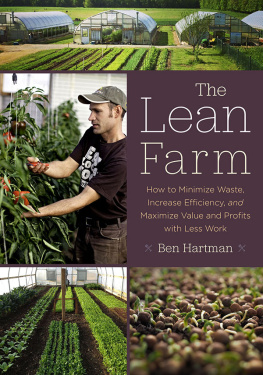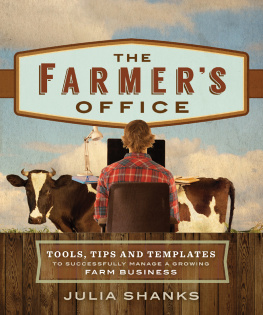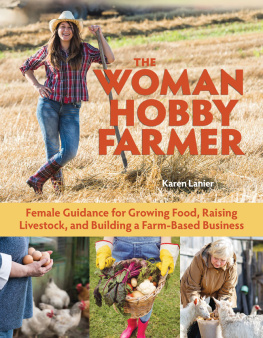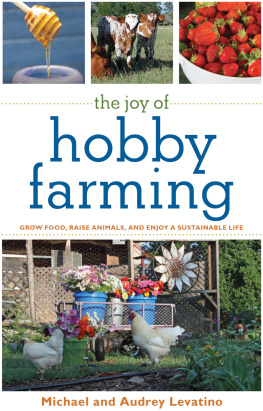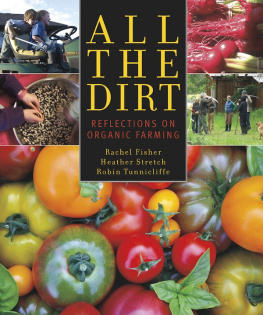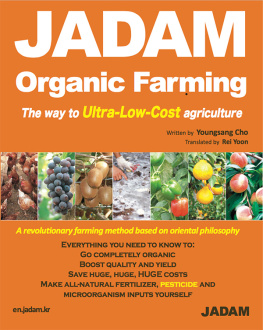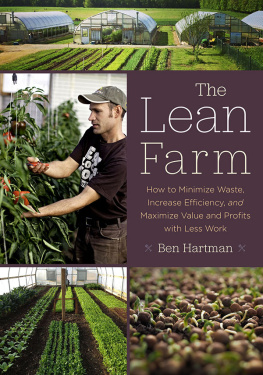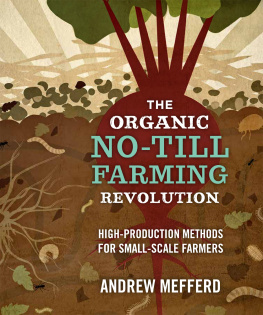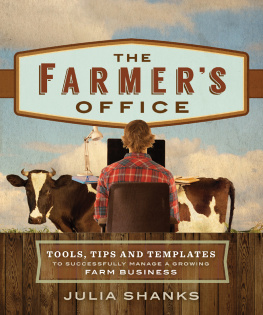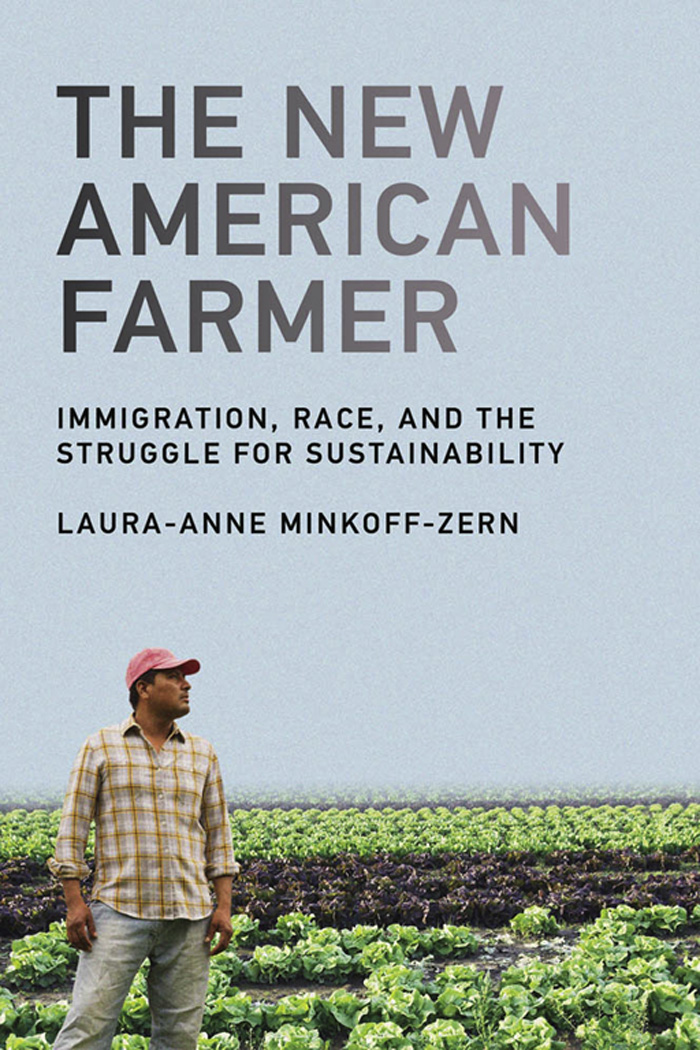
The New American Farmer
Food, Health, and the Environment
Series Editor: Robert Gottlieb, Henry R. Luce Professor of Urban and Environmental Policy, Occidental College
For a complete list of books published in this series, please see the back of the book.
The New American Farmer
Immigration, Race, and the Struggle for Sustainability
Laura-Anne Minkoff-Zern
The MIT Press
Cambridge, Massachusetts
London, England
2019 Massachusetts Institute of Technology
This work is subject to a Creative Commons CC BY-NC-ND license.

Subject to such license, all rights are reserved.
The open access edition of this book was made possible by generous funding from the MIT Libraries.
This book was set in ITC Stone Serif Std and ITC Stone Sans Std by Toppan Best-set Premedia Limited. Printed and bound in the United States of America.
Library of Congress Cataloging-in-Publication Data
Names: Minkoff-Zern, Laura-Anne, author.
Title: The new American farmer : immigration, race, and the struggle for
sustainability / Laura-Anne Minkoff-Zern.
Description: Cambridge : MIT Press, 2019. | Series: Food, health, and the
environment | Includes bibliographical references and index.
Identifiers: LCCN 2019005637 | ISBN 9780262537834 (paperback)
Subjects: LCSH: Hispanic American farmers--United States. |
Agriculture--United States.
Classification: LCC HD8039.F32 U654 2019 | DDC 338.1089/68073--dc23
LC record available at https://lccn.loc.gov/2019005637
10 9 8 7 6 5 4 3 2 1
In loving memory of my mother, Rosemary Minkoff, whose unconditional love and support continues to serve as the foundation of my accomplishments.
d_r0
Contents
Series Foreword
The New American Farmer: Immigration, Race, and the Struggle for Sustainability is the seventeenth book in the Food, Health, and the Environment series. The series explores the global and local dimensions of food systems, and the issues of access, social, environmental, and food justice, and community well-being. Books in the series focus on how and where food is grown, manufactured, distributed, sold, and consumed. They address questions of power and control, social movements and organizing strategies, and the health, environmental, social, and economic factors embedded in food system choices and outcomes. As this book demonstrates, the focus is not only on food security and well-being but also on economic, political, and cultural factors as well as regional, state, national, and international policy decisions. Food, Health, and the Environment books therefore provide a window into the public debates, alternative and existing discourses, and multidisciplinary perspectives that have made food systems and their connections to health and the environment critically important subjects of study, and for social and policy change.
Robert Gottlieb, Occidental College
Series Editor (
Acknowledgments
This book would not exist without the enduring and impressive stories of the farmers highlighted here. Their courage to pursue their dreams and generosity in sharing their insights has allowed me to create an archive of their experiences. It was with deep sadness that I made the decision to keep their names and faces anonymous (with the exception of those identified in photographs), given the political moment of publication. The farmers whose voices are heard in this book deserve recognition for their incredible accomplishments, and I will work for a future where no one needs to fear making their name public in this country. I can only hope my retelling of their stories can act as a guide, informing the general public as well as food and farming institutions, organizations, and media, to increase resources for and acknowledgment of this incredible group of farmers across the nation.
In each location where I did fieldwork, I was welcomed and guided by people who connected me to farmers and their allies. In California, where my research journey began, I am immensely grateful to Adam Sanders. He was my first introduction to the indigenous farmworker and farmer community, and over the past eight years, has created more connections for me than I can recount. He and his wife, Phoebe, continued to host me after I had moved to the East Coast, and sustained our conversations and work on issues of food and farm labor justice together. I am also grateful to the generosity and openness of staff and farmers at the Agriculture and Land-Based Training Association in Salinas, California, where I spent many hours sitting in on trainings and conducting interviews over the years.
In Washington, DC, Larry Laverentz, formally of the Refugee Agricultural Partnership Program in the Office of Refugee Resettlement, and Poppy Davis, formally at the US Department of Agriculture (USDA), both helped me grasp the national landscape for immigrants and refugees in agriculture. Michelle Dudley and Christine Balch at the Crossroads Community Food Network, Stephanie Romelczyk at Westmoreland County Extension, Debbie Bullock and Lucee Kossler at the Natural Resources Conservation Service, and Sherina Logan at the Farm Service Agency (FSA) all opened pathways for meeting farmers and understanding the DC-area producers coming from Virginia.
In New York, Chris Wayne of Grow NYC and the FARMroots program, Marie Ullrich of Cooperative Extension, and Ford Barber from the FSA facilitated interviews and provided new perspectives. Jana and Levi Blankenship opened their home to me and offered much needed respite during my Hudson Valley research trips.
In Minnesota, I am most grateful to Alex Liebman, who originally reached out to me at a conference and invited me to meet farmers with whom he was working. I also wish to thank Jaime Villalaz and Rodrigo Cala at the Latino Economic Development Center in Minneapolis for facilitating multiple introductions and guiding me through the many fruitful regions of Latino/a farmers in the state. Much gratitude to Margot Higgins for welcoming me into her city and home while I worked in the Twin Cities.
I am tremendously appreciative of Colleen Donovan, formally of the Washington State University Small Farms Program, for inviting me to and hosting me in the state of Washington. Colleen, along with Marcia Ostrom, also of the Washington State University Small Farms Program, Katherine Selting Smith, who works with Viva Farms as part of the Northwest Small and Latino Farm Support program at Washington State University and Skagit County Extension, and Jos Limon and Crispin Garza at the FSA served as invaluable guides to the states diverse immigrant growers, providing me with contacts, new perspectives, and much hope for the region. In all these regions, many other market managers, extension agents, and USDA staff assisted me along the way.
Numerous incredible student research assistants have worked with me to complete this project. They assisted me on site visits, transcribed, translated, and coded interviews, copyedited, organized my sources, wrote grant proposals, and helped me think through ideas. I have been beyond lucky to work with great students. At Goucher College, I worked with Sea Sloat and Sarah Meade, and at Syracuse University, I worked with Sara Andrea Quinteros-Fernndez, Rebecca Jean Lustig, Fabiola Ortiz Valdez, Briana Alfaro, Assata Cradle-Morgan, and Maizy Ludden. This book would not exist without their hard work and thoughtful contributions.
Next page

